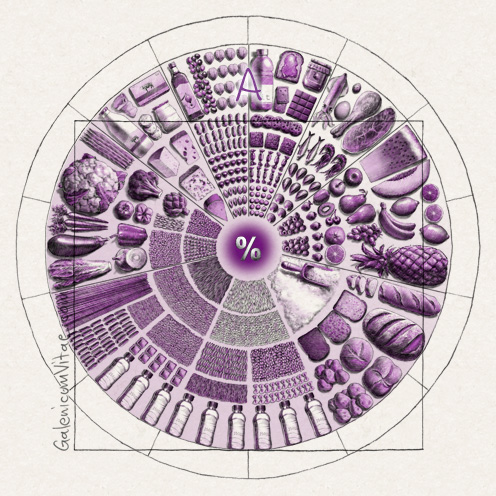Overweight and obesity
Balanced diet
The secret to healthy eating is that your diet is balanced, varied, enjoyable and sufficient. It should include foods from all of the groups that provide nutrients (without going to excess) and an adequate supply of energy, such as in the following daily recommendations:
- 2 servings of lean meat, fish and eggs (at least 2-3 times a week).
- 4-5 servings of fruit.
- 4-6 servings of bread, cereal, rice, pasta or potato starch.
- 2-3 servings of vegetables and legumes.
- 2-4 servings of milk, yogurt or cheese.
- 3-6 servings of olive oil and nuts.
- And about 6-8 glasses of water daily.
- Foods high in calories that contribute little nutritional value, such as soft drinks, ice cream, candy, etc. may be consumed in moderation.
Foods to consume daily
Meat: meat, fish, seafood and eggs (rich in high quality protein, vitamins and minerals, 2 servings per day is recommended).
3-4 servings per week of lean meat (poultry). Portions of 100-150 g of meat.
Fish: white (low fat); blue (rich in polyunsaturated Omega-3 fat that helps cardiovascular health). Portions of 125-150 g of fish.
Eggs: 2-3 eggs (per week).
Fruits: 4-5 servings of fruit.
Breads, cereals, whole grains, rice, pasta, potatoes: rich in carbohydrates, they should be the staple food (4-6 servings daily). Portions of 40-60 g of bread, 30-40 g of breakfast cereal, 60-80 g of rice or pasta and 150-200 g of potatoes. In all cases, multigrain options provide more dietary fibre.
Vegetables and legumes (provide carbohydrates, vegetable protein and dietary fibre): 2-3 servings per day.
Milk and dairy products (yogurt, cheese, etc.) are an important source of high-quality protein, lactose (milk sugar), vitamins and minerals, especially calcium. The recommended serving of dairy varies depending on age and physiological characteristics (for 2-4 servings daily: 1 glass of milk, 2 yogurts, 100 g of cheese and 50 g semi-cured or aged cheese).
Olive oil: rich in heart-healthy fats. The optimal consumption is between 3 and 6 portions per day, preferably uncooked.
Nuts: high in protein, fibre and heart-healthy fats, which makes them a great source of energy.
Water: To maintain a healthy lifestyle, you should drink about 8 glasses (about 2 litres) of natural mineral water per day.
Physical Activity: Improving many aspects of fitness helps to prevent being overweight and combats obesity, as well as increasing bone density, reducing body fat and building muscle. Exercise normalises cholesterol levels and reduces blood pressure, improves glucose tolerance and insulin sensitivity. And, fundamentally, it improves psychological well-being by producing endogenous endorphins. This important collection of benefits makes daily moderate physical activity for at least 30 minutes recommended.
For more information visit:
A balanced diet
http://www.nhs.uk/livewell/goodfood/pages/healthyeating.aspx
The American Heart Association's Diet and Lifestyle Recommendations
http://www.heart.org/HEARTORG/GettingHealthy/NutritionCenter/HealthyEating/The-American-Heart-Associations-Diet-and-Lifestyle-Recommendations_UCM_305855_Article.jsp
Mediterranean diet: A heart-healthy eating plan
http://www.mayoclinic.org/healthy-lifestyle/nutrition-and-healthy-eating/in-depth/mediterranean-diet/art-20047801

 Digestive
Digestive  Blood
Blood Cardiovascular
Cardiovascular Dermatology
Dermatology Genitourinary,
Genitourinary, Hormones
Hormones Infections
Infections Oncology and
Oncology and Musculo-skeletal
Musculo-skeletal Mental health and
Mental health and Parasites
Parasites Respiratory
Respiratory Senses
Senses Various
Various




